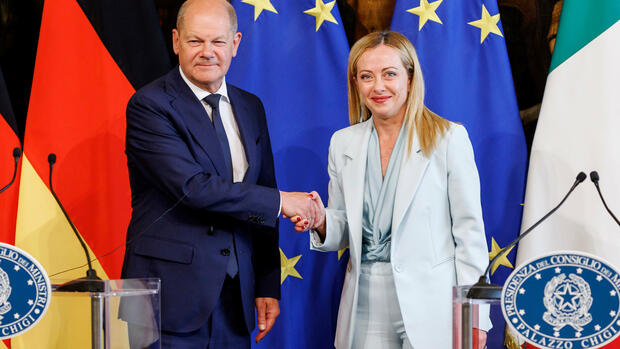Rome Even before his visit to Rome, Olaf Scholz was forgiving: In an interview with the “Corriere della Sera”, which appeared on Thursday morning, he spoke of close, trusting and “very resilient” relations between Italy and Germany. At EU, NATO and G7 level, he and Giorgia Meloni would work “well together”.
Italy’s head of government and the Federal Chancellor also tried to convey the same impression on Thursday afternoon when they appeared together in front of the press in the Palazzo Chigi.
Whether in industrial policy, energy supply or geopolitical issues: “Cancelliere Scholz” (as she calls him) and “the Prime Minister” (as he consistently calls her) work together – and not against each other.
Even Lufthansa’s recently agreed entry into the Italian state airline Ita, against which Meloni has long resisted with national pride, she now praises as “testimony that the national interests” of both countries could also coincide at a strategic level. “Ci vediamo presto”, we’ll see each other again soon, says Meloni at the end and smiles at Scholz. “We are always together, on all the peaks.”
For a long time it was not clear that the relationship between the two would reach such a level of harmony. There were serious doubts about the future of Europe’s third-biggest economy when the 46-year-old won September’s general election and forged a right-wing alliance led by her post-fascist Fratelli d’Italia party.
Bilateral government consultations in autumn – for the first time since 2016
For a long time, Melonis’ initial visit to Germany was avoided. In February she was received with military honors – a sensitive detail among members of the Bundestag and diplomats for a long time. Wasn’t there always the question of whether the head of a radical party could be given such a stage?
“Ci vediamo presto”, we’ll see each other again soon.
(Photo: ddp/ZUMA)
But no matter how much Meloni railed against the EU during the election campaign or portrayed her country as a victim of the “Franco-German axis” in her biography, she has become surprisingly pragmatic since taking office. With a few exceptions, she is statesmanlike, pro-Europe, cooperative and acts in the foreign and financial policy completely in line with her predecessor Mario Draghi.
She conceded expensive election promises, and the debt ratio continues to fall under her leadership. Meloni has pledged Italy’s full support for Ukraine, even visited its President Volodymyr Zelenskiy personally in Kiev, and kept the pro-Russia voices from its allies Lega and Forza Italia clearly in check.
>> Read also: Meloni’s China dilemma: Will Italy remain part of Beijing’s Silk Road?
Scholz and Meloni also revived the German-Italian action plan. The Federal Chancellor announced that there will be bilateral government consultations for the first time since 2016 in the autumn – the plan of action will then be signed in Germany.
The agreement was created under Draghi and is intended to promote cooperation between the two countries in key industries such as battery production. “We want to strengthen and intensify the bilateral dialogue,” said Meloni. It is about topics such as innovation, labor market, climate protection. Both governments recently agreed on a pipeline project to bring green hydrogen from North Africa via Italy to Germany.
There are differences in the stability pact and migration
One issue on which the two still disagree is the reform of the Stability and Growth Pact, the rules of which have been significantly softened by Corona. For Meloni, what is needed is a “new stability pact, very focused on supporting growth,” she explained. It is important that there are “flexible fiscal rules”. Germany is clearly against easing the debt rules.
Another bone of contention is migration. “We are working to find solutions,” said Meloni. But it is also important to pay attention to the demands of the countries that are most under pressure. Scholz countered that of all the asylum seekers who reached Germany in the past year, 80 percent had not previously been registered in another country – without Germany having a direct border with the countries of origin. Primary and secondary migration are closely related here. “Pointing at each other doesn’t help, only working together,” said Scholz.
Scholz: “Migration needs a European solution”
But then both of them appealed to the other EU governments to agree on a reform of the asylum rules. Scholz hoped for an agreement between the interior ministers on Thursday – “or soon at the latest”. The chancellor also renewed his offer to the refugees’ countries of origin to conclude agreements on legal migration to Germany.
Recently, Italy arrested two German ships of volunteer sea rescuers because they had not followed the newly introduced and stricter rules of Meloni’s government. The helpers speak of harassment – and protest against the measures, which they believe endanger human lives in the Mediterranean. The two had not spoken about the topic, Meloni admitted when asked. Perhaps that would have affected the newly won harmony a bit too much.
More: Economy calls for agreement on EU asylum reform
